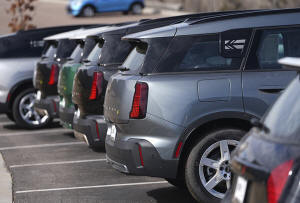US consumers remained cautious about spending last month as inflation
ticked higher
[March 29, 2025] By
CHRISTOPHER RUGABER
WASHINGTON (AP) — Inflation picked up last month and consumers barely
raised their spending, signs that the economy was already cooling even
before most tariffs were imposed.
Friday’s report from the Commerce Department showed that consumer prices
increased 2.5% in February from a year earlier, matching January’s
annual pace. Excluding the volatile food and energy categories, core
prices rose 2.8% compared with a year ago, higher than January’s figure
of 2.7%.
Economists watch core prices because they are typically a better guide
of where inflation is headed. The core index has barely changed in the
past year. Inflation remains above the Federal Reserve's 2% target,
making it difficult for the central bank to cut its key interest rate
anytime soon.
The report also showed that consumer spending rebounded last month after
falling by the most in four years in January. Yet much of the additional
spending reflected price increases, with inflation-adjusted spending
barely rising. The weak figure suggests growth is rapidly slowing in the
first three months of this year as consumers and businesses turn
cautious amid sharp changes in government policies.
“Inflation too hot and spending too cold,” said Stephen Brown, an
economist at Capital Economics, a consulting firm, in an email. “The Fed
is unlikely to cut interest rates this year.”
Brown estimates that economic growth could fall to zero in the first
three months of this year, down from 2.4% in last year's fourth quarter.
Inflation remains a top economic concern for most Americans, even as it
has fallen sharply from its 2022 peak. Donald Trump rode dissatisfaction
with higher prices to the presidency and promised to quickly bring down
inflation, but the yearly rate is higher now than in September, when it
briefly touched 2.1%.
Consumer spending rose 0.4% in February, though the gain was just 0.1%
after adjusting for prices. The mild increase follows a sharp 0.6% drop
in January.

The spending and inflation figures steepened a market downturn early
Friday. The broad S&P 500 stock market index fell 1.4%. The Dow Jones
index fell more than 500 points and the Nasdaq fell as well.
The spending increase was driven by greater purchases of long-lasting
goods, such as cars and appliances, which could reflect an effort by
shoppers to buy things before tariffs are imposed. They are the kind of
purchases that won't likely be repeated in coming months.
Spending on services, including discretionary spending such as at
restaurants and hotels, fell.
“The fact that consumers chose to increase outlays on goods that are
about to see price increases at the expense of the far more economically
important service sector provides insight into the mindset of the
consumer,” said Joseph Brusuelas, chief economist at tax and advisory
firm RSM.

[to top of second column] |

Unsold 2025 Countryman utility vehicles sit on display at a Mini
dealership Sunday, March 23, 2025, in Highlands Ranch, Colo. (AP
Photo/David Zalubowski)

Also Friday, the University of Michigan released its updated consumer
sentiment survey for March, which showed a sharp drop in Americans'
outlook for the economy. The survey also found growing anxiety over
inflation and jobs.
“This month’s decline reflects a clear consensus across all demographic
and political affiliations,” said Joanne Hsu, director of the survey.
“Republicans joined independents and Democrats in expressing worsening
expectations since February for their personal finances, business
conditions, unemployment, and inflation.”
Trump has slapped 20% tariffs on all Chinese imports, 25% import taxes
on steel and aluminum, and on Wednesday said he would hit imported cars
with another 25% duty. Most economists, and the Federal Reserve, now
expect inflation to tick higher this year as a result of the tariffs.
Fed Chair Jerome Powell last week said elevated inflation from the
tariffs could be temporary. But he also added the outlook was unusually
uncertain given the swift changes in policy from the White House.
On a monthly basis, prices rose 0.3% in February from the previous
month, the same as in January, while core prices increased 0.4%, the
largest increase in more than a year. Increases at that pace, for a full
year, would drive inflation far above the Fed's 2% target.
One bright spot in the report was a big jump in incomes for the second
straight month — they rose 0.8% in February from January. Higher income
with weaker spending pushed up the savings rate, which can fuel future
spending. But it also could reflect greater caution among consumers.
“Savings went up, consistent with reports of flagging consumer
confidence, rising uncertainty about the future and reduced expectations
for the future,” Carl Weinberg, chief economist at High Frequency
Economics, said.
Consumer and business confidence in the economy has fallen sharply since
Trump began rolling out tariffs, and a measure of Americans’ outlook for
the future of the economy dropped to a 12-year low on Tuesday. Many
polls find that most of the public sees the economy as fair or poor. A
survey last month by the Pew Research Center found that 63% of Americans
still see inflation as a “very big problem.”
Apparel company Lululemon on Thursday became the latest retailer to warn
that slumping consumer confidence will hurt sales, while the parent
company of Tommy Bahama, Lilly Pulitzer, and Johnny Was stores said that
sales slowed to start the year as consumer sentiment darkened.
Nike previously issued a similar warning and expectations from major
retailers like Target and Walmart have grown subdued as customers pull
back.
All contents © copyright 2025 Associated Press. All rights reserved |